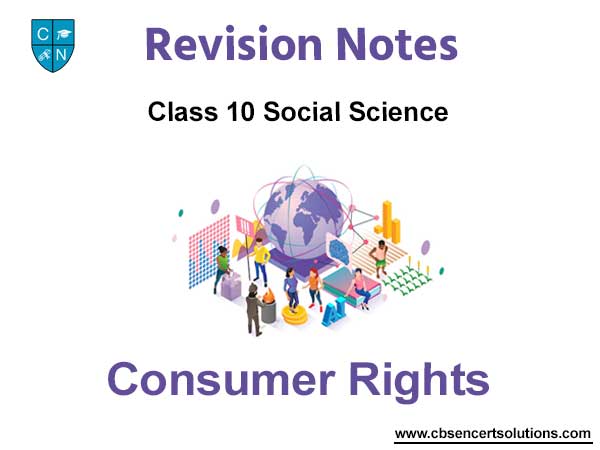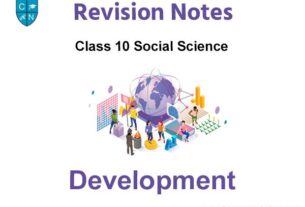Please refer to Consumer Rights Class 10 Social Science notes and questions with solutions below. These revision notes and important examination questions have been prepared based on the latest Social Science books for Class 10. You can go through the questions and solutions below which will help you to get better marks in your examinations.
Class 10 Social Science Consumer Rights Notes and Questions
Consumer is a person who buys and uses a good or service from the market after making a payment.
Some common ways by which consumers may be exploited by manufacturers and traders:
• Underweight and under-measurement: Goods sold in the market are sometimes not measured or weighed correctly.
• High prices: Very often the traders charge a price higher than the prescribed retail price.
• Sub-standard quality: The goods sold are sometimes of sub-standard quality, e.g. selling medicines beyond their date of expiry, selling deficient or defective home appliances.
• Duplicate articles: In the name of genuine parts or goods, fake or duplicate items are sold.
• Adulteration and impurity: In costly edible items like oil, ghee and spices, adulteration is common in order to earn more profit. This causes heavy loss to the consumers.
• Lack of safety devices: Fake or inferior electronic goods, electrical devices or other appliances, produced locally lack the required in-built safety measures. This may cause accidents.
• Artificial scarcity: Some unscrupulous businessmen create artificial scarcity by hoarding. They sell their goods for a higher price by creating panic among consumers.
• False and incomplete information is provided by sellers which can easily mislead consumers.
• Unsatisfactory after-sale service: The suppliers do not provide the satisfactory after-sale service despite the necessary payments on items such as electronics, automobiles, etc.
Consumer International:
An international umbrella organization to over 240 member organizations from over 220 countries.
COPRA: This Act (COPRA) 1986 tries to ensure:
• information, safety, redressal, representation and consumer education.
• Under COPRA, a’ three tier quasi-judicial machinery at the district, state and national level helps in solving consumer disputes.
• Consumer Movement with its different organisations helps in exerting pressure on business firms as well as the government to correct their conduct which may be against the interests of the consumers at large.
Right to Information Act, 2005:
This act gives rights to the citizen to have information about the government departments, their policies practices and procedures.
ISI Mark:
A certification mark for industrial products in India developed by the Bureau of Indian Standards.
AGMARK:
A certification mark employed on agricultural products in India by the directorate of Marketing and Inspection.
Hallmark:
An official mark struck on items made of precious metals like gold silver platinum etc.
Duties of consumers while shopping are
A consumer must check for a certification of quality such as ISI mark, Agmark or Hallmark; Consumers must ensure that they receive a valid bill or cash memo and warranty on purchase of items especially electronic goods such as TV, laptop, mobile phones etc.; The consumer should not allow a salesman to force him/her to buy a particular brand; and a consumer should inform concerned authorities if a shopkeeper is selling defective goods.
Consumer Forum:
The consumer movement in India has led to the formation of various organizations locally known as consumer forums or consumer protection councils. They guide consumers on how to file cases in the consumer court. They represent consumers in the consumer courts. These voluntary organizations receive financial support from the government for creating awareness among the consumers.
Rights of Consumers :
Rights which are provided by law :
– Right to safety
– Right to be informed
– Right to choose
– Right to be heard
– Right to seek redressal
– Right to consumer education.
Factors causing exploitation of Consumers :
– Limited information
– Limited supplies
– Limited competition
– Low literacy
Duties of Consumers :
– To purchase quality marked products such as ISI, AGMARK etc.
– To ask for cash memo for the items purchased whenever possible.
– To make complaint for genuine grievances consumers must know their rights and must exercise them.
Demerits of Consumer Redressal Process :
– The Consumer Redressal Process is becoming cumbersome expensive and time consuming.
– Many a time, consumers are required to engage lawyers. These cases require time for filling and attending the court proceedings etc.
– In most purchases cash memos are not issued hence evidence is not easy together.
– Most purchases in the market are small retail sales.
– The enforcement of laws that protect workers, especially in the unorganised sectors is weak.
– Rules and regulations for working of markets are often not followed.
Consumer Protection Act – 1986 (COPRA)
– To protect and promote the interest of consumers.
– Under COPRA a three-tier quasi-judicial machinery at the district, state and national levels is set up for redressal of consumer disputes.
– The district level court deals with the cases involving claims upto Rs. 20 lakhs; The State level courts between Rs. 20 lakhs and Rs. 1 crore and the national level court deals with cases involving claims exceeding Rs. 1 crore.

We hope the above Consumer Rights Class 10 Social Science are useful for you. If you have any questions then post them in the comments section below. Our teachers will provide you an answer. Also refer to MCQ Questions for Class 10 Social Science


